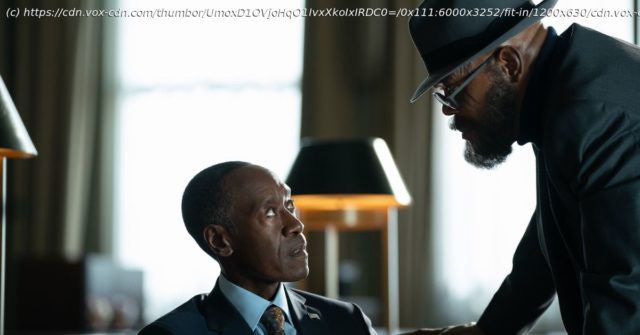Despite the efforts of Samuel L. Jackson, Don Cheadle, Olivia Colman, and Emilia Clarke, Disney Plus’ Secret Invasion doesn’t have much to say about spies, Skrulls, or trust.
There is a moment near the end of the first episode of Marvel’s Secret Invasion TV series that will feel uneasily familiar to politically attuned viewers. In it, a young man walks briskly through a public square in Moscow, a backpack draped over his shoulder. He is an infiltrator, a hidden alien Skrull whose true identity is undetectable to those around him, and his backpack contains a “dirty bomb” capable of causing mass death to those around him. The attack is halted, courtesy of series protagonist Nick Fury, but in the aftermath, a suspect apprehended by authorities shouts, again and again, “I’m an American! I’m an American!” Nobody listens.
Watching that moment play out, you could be forgiven for thinking that the Disney Plus series is out to make a trenchant political critique: that, for perhaps the first time in the decade-plus tenure of the Marvel Cinematic Universe, it intends to use the tools of superheroism and science fiction to draw our attention to the overreach of military authority, and the violent suspicion bred by fears of terrorism. Alas, you would be wrong. A few minutes into the following episode, the moment has been largely forgotten, the narrative having moved along to a plot about government officials and SHIELD bigwigs replaced by alien shape-changers in a conspiracy that feels both labyrinthine and inconsequential at the same time.
It is, in fact, altogether puzzling: How can a series rooted in fears of government conspiracy, and the inability to trust or believe our neighbors and compatriots, seemingly have nothing to say about politics or the government at all? How can a story about asylum-seeking refugees driven toward militant violence manage to avoid any actual evocation of either subject at all? Or, to put it more bluntly still, why are the politics of Secret Invasion so hard to trust?Aliens among us
If we want to understand the politics of Secret Invasion, we need to go back to a very different political moment: the latter days of the George W. Bush administration in 2008, when the Secret Invasion comic series took form at Marvel. The early 2000s were a heady time for Marvel Comics. Despite its self-styled reputation as “the world outside your window,” Marvel had for decades engaged with real-world politics only in the most anodyne or else allegorical terms — notable outliers notwithstanding. But the first decade of the new millennium confronted the company with a heady brew of artistic, political, and editorial influences that must have seemed unprecedented. And compounding it was the internal politics of the comic publisher itself, which was climbing out of the twin crises of bankruptcy and cratering sales thanks to the guidance of new editor-in-chief Joe Quesada.
So when it came time for Marvel’s marquee writer Brian Michael Bendis to put together the company’s major event series of 2008, he drew heavily from the mood, zeitgeist, and newsy language pervading the wider pop culture. His vehicle was a story he had been setting up since taking over the publisher’s Avengers franchise in 2005: a cloaked, mysterious conspiracy involving infiltrators throughout the ranks of the planet’s political, criminal, military, and superheroic infrastructure that would turn out to be the work of the shape-shifting aliens known as Skrulls. And so it was that Secret Invasion would become Bendis’ big foray into the cultural minefield of post-9/11 discourse.
Bendis’ Skrulls were (for the first time) given an explicitly religious dimension to their warfare. Throughout the series, each time the aliens dispatch one of their human enemies, they repeat the cryptic refrain, “He loves you.” This is revealed to be a reference to a foreign and hostile god, who has given his blessing to the conquest of Earth. Elsewhere, the Skrull’s attacks are explicitly referred to as “extremism” and “terrorism” (albeit by the heroes combating them), and the Skrulls refer repeatedly to the “prophets” who foretold their holy conquest of a new homeworld.
It was a metaphor that readers weren’t likely to miss, and the storyline attracted a vast array of response, condemnation, and debate, even as it continued Marvel’s early-2000s hot streak of high-selling crossovers. For better or worse, the Secret Invasion comic made a statement about the politics of its time, and it took its lumps accordingly. So why does the Secret Invasion TV series feel so curiously incapable of doing the same?Who can we trust?
If the Secret Invasion of 2008 was about Bush-era paranoia manifested through the language of science fiction invaders, the Secret Invasion of 2023 is — at least superficially — a reflection of the fears and obsessions of the post-Trump era.






